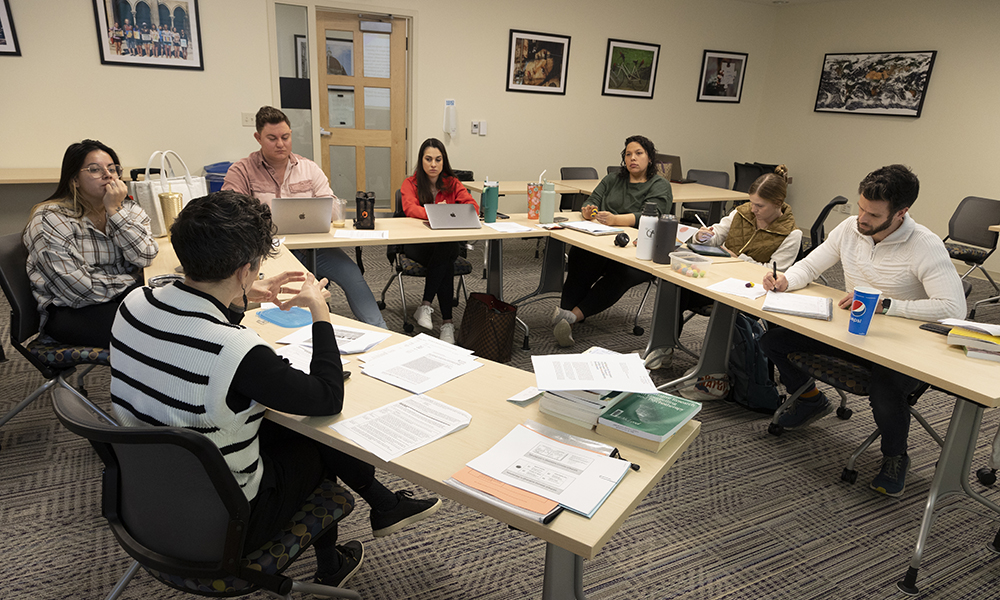Low-residency approach in counseling program increases access, enrollment
News
A unique teaching approach in the Counseling & Supervision PhD program in the Graduate Psychology department allows students to pursue a doctorate while maintaining full-time work and balancing personal responsibilities.
The program operates in a “low-residency” model—meaning students participate mainly online through asynchronous learning, class meetings on Zoom, and in-person residency weekends four times per year. The most recent residency weekend took place on February 1 and 2.
Traditionally, PhD programs operate in a “brick and mortar” model, according to Stephanie Crockett, director of the Counseling & Supervision program. These programs require students to be physically present taking classes on site. Students are usually unable to work full time, rely financially on graduate assistantships, and center time and energy in graduate work.
“That excludes a lot of folks who don’t have the resources to do that,” said Crockett. “It’s a lot to ask folks to pick up their lives to pursue a PhD.”
Debbie Sturm, a professor in the Counseling and Supervision PhD program, was involved in the development and implementation of the low-residency model. With support from Robin Anderson, Department Head of Graduate Psychology, and Sharon Lovell, Dean of CHBS, the low-residency model was instituted in 2021. Three cohorts of students have participated in the low-residency model since.
The accessibility of the program has increased interest in the program for prospective students. “Our enrollment has more than tripled,” said Crockett. “Applications are way up. The 2024 cohort has the most applicants we’ve ever had.”
Crockett said the low-residency structure is “a very sustainable model for a PhD program.”
“I work full time and I go to school full time,” said Ashley Hough, a student in the PhD program. “But the program is very manageable. You really learn how to make the assignments work for you.”
The Counseling & Supervision PhD program aims to train individuals who already have a master’s degree in counseling and are interested in leadership in the counseling profession. The program offers well-rounded training in five core areas: teaching, supervising, leadership and advocacy, research, and counseling. Most students pursue faculty positions in master’s and doctoral counseling programs after completing the program.
“Students don’t have to move to Harrisonburg. Our program has students all over the country,” said Crockett. With a limited amount of accredited PhD programs in certain corners of the country, the hybrid approach makes pursuing a doctorate accessible to individuals who previously weren’t able to continue their studies or advance their careers through a PhD.
“I also think with the low-residency model we are able to offer a program that gets students through in a timely and efficient manner,” said Crockett. With a regimented program of study, Crockett says Counseling & Supervision tries to be “intentional about our curriculum” to ensure students are out in three years or four years, for full-time or part-time students respectively.
“One of the main values that has always been at the center of the [low-residency] program is to make sure people, even though they are learning all over the country, can center connections,” said Crockett. “Residency is a good way to get people connected and energized about the work they’re doing.”
“For a long time, the myth was that if you were doing anything remote, it would compromise relationships,” said Sturm. But once the low-residency model was in place, Sturm says “We’ve found that to be the opposite.”
“We really do build relationships,” said Kyle Rose, a student in the program. “It’s about the best of both worlds – being able to have the flexibility and still feel deeply rooted in the people you learn with and from.”
Students frequently meet one-on-one with faculty members for mentoring. “Early on, it’s mentoring related to developing their career,” said Crockett. “As they get further in, it becomes more focused on their dissertation and providing support.”
Students start working on their dissertation within their first year in the program, and the article-style dissertation allows students to exit the program with three publications instead of one.
Crockett noted that online learning “will continue to be part of education in one way or another going forward. Our educators will know how to teach online” and accrue other related skills through the program.
“I really think it gives them a flexible skill set,” said Sturm, when asked about how the low-residency model impacts students’ experiences in the program. “They become flexible in a diverse way of teaching and connecting.”
“I feel like I belong here.” said Ashley Hough about the program. “I feel very confident in my identity as a counselor educator.”
